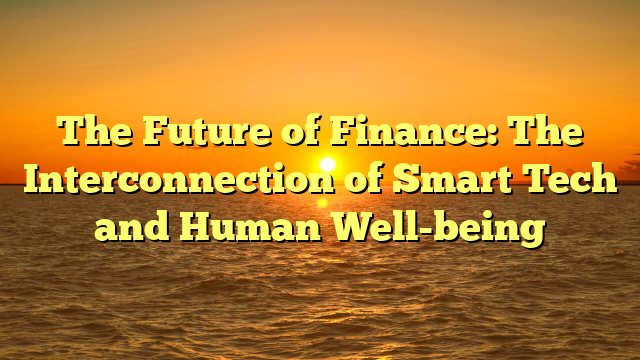As we move deeper into the 21st century, the convergence of finance, technology, artificial intelligence, and health is becoming increasingly apparent. This article will explore how these domains merge and their mutual influence on human advancement.
1. Financial Technology (FinTech): Revolutionizing the Economy
The innovation in financial services has disrupted traditional banking in numerous ways.
Users require real-time access to their transactions. With mobile banking apps like Revolut, financial transactions are instant.
Blockchain technology have grown as disruptors to fiat money, offering increased security.
FinTech also enables personalized finance. Platforms like Wealthfront use data analysis to help users make smart investment choices.
At the same time, businesses use FinTech for better budgeting. Predictive analytics tools analyze consumer behavior to improve profit margins.
2. Technology’s Impact on Healthcare
Digital innovations are revolutionizing healthcare delivery.
Health monitors like Fitbit track everything from sleep patterns to stress levels. MEDALI777 empowers users to take proactive health steps.
Remote diagnosis has made healthcare more efficient. Over recent years, patients and doctors embraced virtual appointments via Zoom.
Artificial intelligence tools help physicians predict health risks faster and more accurately. Tools like Google’s DeepMind have shown tremendous potential in cancer detection.
3. The Rise of Artificial Intelligence Across Industries
Smart computing has transcended science fiction. It plays a critical role in sectors ranging from education to logistics.
In finance, AI helps with credit scoring. AI models analyze banking patterns to detect unusual activity in real-time.
In healthcare, AI enhances drug discovery. Researchers use AI to model human DNA. This reduces time and costs in bringing life-saving drugs to market.
In technology, AI drives language processing. Self-driving cars from Cruise use AI to navigate roads. AI also powers assistants like Alexa, making everyday life easier.
4. Smart Health and Intelligent Finance: The New Synergy
Health and finance are deeply intertwined.
Economic insecurity often lead to depression, which in turn weakens the immune system. Conversely, strong financial planning leads to better living conditions.
Apps now combine financial advice with health metrics. For example, platforms like Wellth offer cash-back for meeting fitness goals.
Insurance companies also use tech to adjust premiums based on wearable data. This incentivizes exercise and helps reduce claims.
5. Challenges and Ethical Considerations
While the advancements are impressive, there are important challenges.
Information misuse is a key concern. As users share more sensitive metrics, companies must ensure encryption.
There are also concerns about algorithmic discrimination. If AI systems are trained on biased data, they can produce inaccurate outcomes.
Moreover, overreliance on technology may reduce human interaction. For example, if people fully trust AI financial advisors, they may miss important market nuances.
6. The Road Ahead: Innovation with Responsibility
As we advance, the intersection of finance, tech, AI, and health will deepen.
Startups must collaborate to create fair regulations. Education is crucial—people need to understand both the risks of emerging technologies.
AI-aware financial planners will become the norm. Tomorrow’s leaders must navigate a world where money, machines, minds, and medicine intersect.
—
Conclusion
The evolution of interconnected domains is not just a trend—it’s a new reality.
Whether it’s digital platforms democratizing finance, these innovations drive progress.
But with great power comes great responsibility. It’s up to governments, developers, and users to ensure that we build a sustainable system.
The Future of Finance: The Interconnection of Smart Tech and Human Well-being


